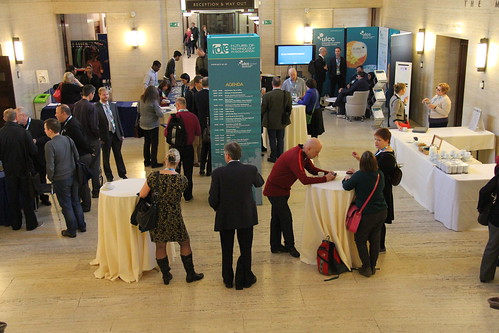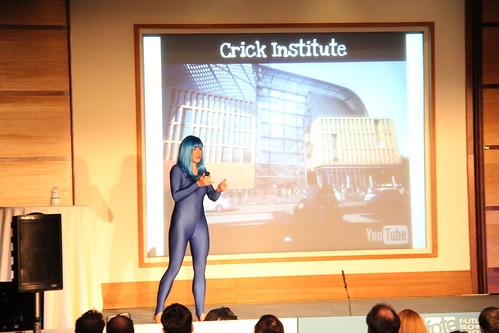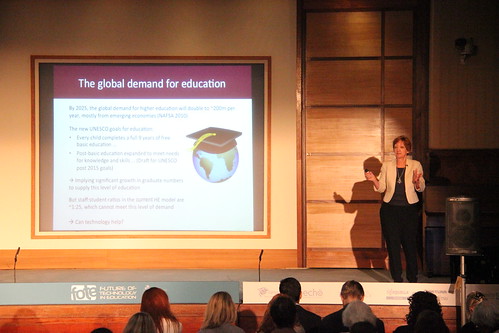Future of Technology in Education Conference

Last week I represented the Open Education Working Group at the Future of Technology in Education Conference (FOT13) held at ULCC. I was interested in hearing about any new open education initiatives, both in the UK and abroad.
The day was really interesting, though I had hoped to hear more about open education as a global concept, discussions centred very much round individual institutions initiatives. Below are some of the most relevant talks.
Job title aside, Alicia Wise, Director of Universal Access at Elsevier, began her talk by being upfront about her organisation’s ‘backward thinking’ with regard to open access. Elsevier are engaging with the open access model and are apparently launching one open access journal week on average…but they are still a commercial company. While Alicia explained that she wants to see content “swish effortlessly round the web” the Twitter backchannel pointed out Elsevier’s growing R&D spend and exploration around journal rental had ultimately resulted in bigger profits. Alicia was in a tricky position but I was pleased to hear her touch on ideas around opening up research data saying that it currently has “high importance and low availability”.
After lunch Lindsay Jordan, Educational Developer, University of the Arts London woke us all up by launching on to the stage in a full-body blue lycra leotard (“why so blue Lindsay?”) She then gave a really interesting talk looking at the differences between online and F2F learning. She explained that the drop out rates in distance/online learning are often to do with life events, but even more to do with isolation. Through a demo of the cupsong and a piano solo Lindsay explained that what we (sometimes) need is bite size learning and (sometimes) less flexibility. The term eventedness also came up – this is the idea that you are part of a shared endeavor – an event. David White has written a blog post about the term and I hope to revisit the ideas behind it for this blog in the near future – all very relevant to event amplification.
Martin King’s talk was by far my favourite of the day. His 101 slides dealt with opening up formal learning through diversity. He talked about how we will deal with 3 billion minds coming online – “the network event horizon of global connectivity”. Most of these will be from developing countries, many will have disabilities, many will be very young or very old and education will have to change to meet what they need. Connectivity is increasingly considered a human right. Access to Internet is currently only available to a third of world population but in the next few years new technology will be able to really help open up education and democratize access to information. Martin concluded by pointing out our western elitism and that “we are no longer the centre of our own universe”.Kevin Ashley, director of the DCC gave the next presentation on Research data: bothersome burden or treasure chest? Kevin explained that 164 HE institutions in the United Kingdom received over £4.4 billion in research funding last year. Research funders worldwide are placing increasingly stringent requirements on researchers and research institutions regarding data produced by research. Kevin made the case for opening up research data. The reasons are many; for example open data greatly increases research citation rate, discoverable scientific data leads to reuse in sometimes surprising and serendipitous ways. Not only this but willingness to share research data related to strength of evidence and quality of results.
The penultimate talk was from Matthew Yee-King, Goldsmith University on MOOCs: a view from the trenches. In a highly practical talk that considered the approach taken at Goldsmith in creating the Creative Programming for Digital Media & Mobile Apps Coursera course, Matthew also took time to touch on issues like why institutions create MOOCs (a marketing exercise?) and dropout rates. He put forward some interesting statistics: the creative programming course had 95k enroll, 38k active and 6.6k finish. The majority of those participating were already had Bachelors or Masters degrees, making the argument that MOOCs are continuing education for those already educated not the democratisation of HE. Matthew was also frank about the moderation of forums and how they had deleted inappropriate comments, making the MOOC not quite so open.
The final talk was given by Diana Laurillard, Professor of Learning with Digital Technologies in the London Knowledge Lab and Assistant Director for Open Mode learning at the Institute of Education. Diane discussed pedagogies for large-scale student guidance and began by asking why are we spending millions on MOOCs for those who already have degrees? And why are offering MOOCs for free when students (in the UK) are paying £9k? Diane explained that the approach we are taking will not satisfy the worldwide demand for higher education (currently estimated as ~ 100m per year (UNESCO)). Her suggestion is ‘education economics’, moving from the current norm of a 1:25 staff student ratio to a much higher ratio. To do so we need to consider ways of improving and sharing the pedagogies that achieve high quality student support and attainment on the large scale. Technology may well be the answer but we need to invest and support teaching innovation. Diane ended by saying that for her education is not like any other industry – I’d have to agree.
It did feel a little like we were only just getting to the heart of the matter at the end of the day, and it would have been good to talk a little more about this future. A future where more people are online than ever before and they deserve an education. When open education goes beyond sharing a few courses as a branding exercise. But a great day nonetheless.
 Open Education Working Group
Open Education Working Group 







Leave a Reply